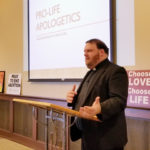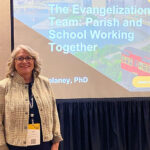A paradigm shift in forming the faith of our children and grandchildren is essential to the future of the Catholic Church. Surveys show many young adults view the church as irrelevant and embrace a “whatever” attitude toward beliefs. Their absence deprives us of vitality, fresh insights and jeopardizes our ability to transmit the joy of the Gospel to succeeding generations.
In response, the Davenport Diocese has launched an initiative partnering parents and parishes to facilitate change that places faith at the center of family life. St. Anthony Parish in Knoxville boldly stepped forward as the first of the diocese’s 79 parishes to enter the initiative, a three-year process called Strong Catholic Families Strong Catholic Youth. We applaud the commitment of St. Anthony’s pastor and parishioners and encourage other parishes to join the initiative.
Don’t expect the process to be easy. Instead, imagine what our church would look like if the pews were full of children and adults who take what they receive in the liturgy into their daily lives, sharing the Gospel through their actions and deeds. It won’t happen without seismic change. Parents need to assume their God-given role to form their children in the faith; to be fully aware of the family as the domestic church. Parishes must stop conveying the message — intentionally or not — that parents aren’t capable of being the primary formers of their children’s faith.
Consider four critical findings of the National Study of Youth and Religion (NSYR):
• Parents are primary in passing on the faith. Others have an impact, but nothing like parents do.
• Today’s youth are very family friendly. They want more time with their families and they’re willing to ask for that.
• Faith is very good for kids: more = more. The more they have faith as a part of their lives, the closer they are to God and the more they avoid activities we don’t want them involved in — drugs, alcohol, etc.
• The Catholic Church’s efforts in passing on the faith to the next generation have fallen short.
Today’s parents may not feel equipped to teach the faith to their children, but as Linda Moses, a national trainer for Strong Catholic Families Strong Catholic Youth observes, living the faith is a good place to start. Expectant mothers and fathers “talk” with their babies in the womb; why not “pray” with the baby in the womb? Parents are reading age-development books to educate themselves about their children’s physical and emotional growth. Let’s give them faith development books as well. Demonstrate and express forgiveness in the home; encourage family meals and relate them to the celebration of Eucharist at Mass.
Some other great ideas for parents from Strong Catholic Families Strong Catholic Youth: invite children and teens in leading prayer before meals or bedtime. Read and discuss Scripture as a family and invite each member to share what God is saying to them through the Scripture reading. Use simple blessings at night or to commemorate a milestone. Display religious art around the house; have Bibles geared toward family members’ age levels. Expect each family member to become actively involved in parish ministry or community service. Make attendance at Mass, youth ministry, faith formation and church events high family practices.
As parishes, we need to adjust our frame of reference as well. We ought to be exploring inventive approaches to equipping parents for their crucial role as their children’s primary religious educators. Give them strategies to effectively “apprentice” their children in the faith, suggests Sean Reynolds in the “Source Book on Adolescent Catechesis Volume II.”
Faith formation isn’t drive-through service. Parent shouldn’t expect to drop off their kids in September for religious education and receive a disciple in May. So parishes must break away from a “provider mentality.” One place to start: provide time for a short lesson for parents attending meetings about their children’s sacramental preparation. Place an emphasis on what happens after the sacrament. “Sacraments are not what we get; sacraments are what we become,” Moses observes.
Our parishes need to engage youths and young adults in the liturgy and to nurture and invest in young adult catechists comfortable with the culture and technology.
Retired Pope Benedict XVI said that the new evangelization depends largely on the domestic church. It is imperative for all of us as the body of Christ to focus on the family, in its many shapes and forms, and accompany them on this journey of faith.
Barb Arland-Fye











